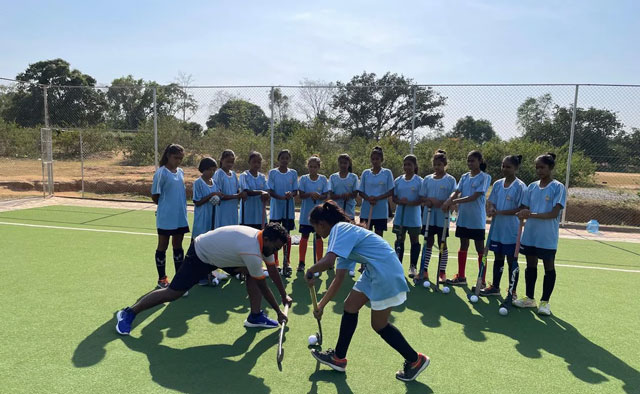Daijiworld Media Network – New Delhi
New Delhi, Aug 9: In Simdega, Jharkhand, children head to school each morning with hockey sticks in hand — sometimes before they even remember their school bags. The sticks, often carved from wood or bamboo, are put to use in an hour-long game before classes begin. Far away in Mizoram’s hills, evenings come alive as entire communities gather on local grounds, where football is played with equal enthusiasm by teenagers and middle-aged players.
These glimpses capture how deeply sports are woven into India’s community life, offering not just recreation but also education, social unity, and shared ambition. Across the nation — from hockey in Jharkhand to badminton in Mizoram — strong sporting traditions present an opportunity to channel this energy for inclusive growth.

The newly unveiled National Sports Policy 2025 aims to nurture grassroots talent, revive traditional games, and use sport as a tool for life skill development. The move comes as more than 70% of Indian children fall short of the World Health Organization’s physical activity benchmarks — a trend linked to undernutrition, obesity, and poor fitness levels. Experts warn that by 2030, India could have over 27 million obese children, making community sports a public health priority.
Integrating physical literacy into education for children aged 6–14 can improve movement skills, academic performance, and cognitive development. However, with many schools prioritising academics over physical activity, community initiatives play a vital role in filling the gap. Studies show that sports help reduce dropout rates, improve literacy, and tackle issues like unemployment and juvenile delinquency.
Beyond fitness, sports instil confidence, discipline, resilience, and humility. In Mizoram, partnerships like the one between the Pullela Gopichand Badminton Academy and state governments have helped strengthen the culture of play while boosting community bonds.
The Life Through Cricket programme, run with the Cricket Live Foundation, has transformed lives of boys facing personal struggles, including addiction. Coaches report reduced substance abuse, improved school attendance, and stronger aspirations among participants.
Yet, many girls are still excluded due to social norms, lack of facilities, and menstruation-related stigma. Grassroots projects in Jharkhand, supported by Tata Trusts, have trained coaches in menstrual hygiene management, breaking barriers and encouraging girls to participate.
Sports also open doors to alternative livelihoods, particularly in rural and tribal areas, by spotting talent and offering career pathways. Initiatives like the Khelo India Youth Games and Khel Mahakumbh are redefining school sports and providing scholarships for competitive training. However, only 20% of schools have basic infrastructure, with rural areas facing the greatest shortages.
Experts call for a multi-tiered approach — integrating sports into education, encouraging mass participation, creating regional training hubs, and developing sports academies as centres of excellence. Rooted in the Olympic values of fair play, respect, friendship, and excellence, such initiatives can nurture champions while driving community well-being.
From Simdega’s hockey fields to Mizoram’s football grounds, the message is clear — investing in inclusive, community-led sports is about building a healthier, stronger India where every child can dream, grow, and lead through the power of play.